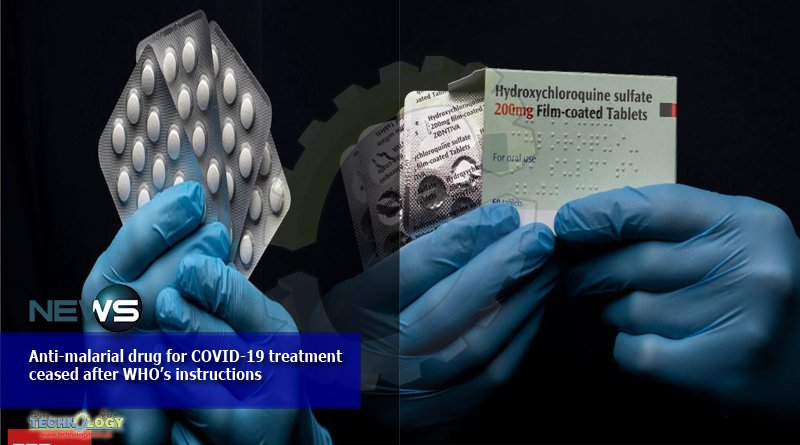The Pakistani health authorities have decided to temporarily suspend the clinical trials of anti-malarial drug chloroquine and its analog hydroxychloroquine (HCQ) for the treatment of COVID-19 patients after the World Health Organisation’s (WHO) decision to temporarily halt the HCQ study over safety concerns.

“The Drug Regulatory Authority of Pakistan [Drap] will issue notices to the health facilities carrying the anti-malarial trials in Pakistan to put them on hold till further instructions,” Special Assistant to Prime Minister Dr Zafar Mirza told, saying that the Executive Group of the Solidarity Trial, representing 10 countries had decided to review and temporarily suspend the clinical trials of HCQ in COVID-19 patients.
Well before the WHO’s advisory, several hospitals treating the COVID-19 patients in Karachi and other cities of the country had halted the use of chloroquine and HCQ for the treatment of patients infected with COVID-19, saying that the drug was not producing desired results when used alone or in combination with anti-biotic azythromycin.
“We had already reduced the use of chloroquine and hydroxychloroquine for the treatment of COVID-19 patients as data indicated that it was not proving very much effective. As far as the trials are concerned, the WHO has paused the trials to reassess the safety data so we paused it too,” said Dr. Faisal Mahmood, an infectious diseases expert at the Aga Khan University Hospital in Karachi.
Over 400 hospitals in 35 countries, including Pakistan, we’re actively recruiting patients and nearly 3,500 patients had already been enrolled from 17 countries, the WHO said, adding that it initiated the Solidarity Trial two months back to evaluate the safety and efficacy of four drugs and drug combinations against COVID-19.
The health authorities in Pakistan said that at the moment, the University of Health Sciences (UHS) in collaboration with a local pharmaceutical company, Getz Pharma, was conducting the clinical trials of HCQ for the treatment of COVID-19 patients at a couple of health facilities in Lahore while some health facilities in Karachi were also using the anti-malarial drugs for the treatment of patients with coronavirus infection.
They said that last Friday, a reputed medical journal, The Lancet, published an observational study on HCQ and chloroquine and its effects on COVID-19 patients that had been hospitalised. “Authors of the study reported that among patients receiving the drug, when used alone or with a macrolide, they estimated a higher mortality rate,” said an official of the national health services ministry of Pakistan.
The health official maintained that although both HCQ and chloroquine phosphate were being used experimentally at various health facilities in Pakistan for the treatment of COVID-19 patients, clinical trials had yet to start in the country as medical universities and facilities were in the process of enrolment. “All new trials will need to go through a review based on the current evidence. But remember that many times, a multiple number of trials are needed to comprehensively know the answer,” the official added.
To a query, he said all the trials had an oversight mechanism to see if any interim results of the trial or other trials in the world are there and secondly, if any changes or abandonment is required.
Quoting the WHO, officials in the Ministry of National Health Services said the Executive Group of the Solidarity Trial, representing 10 of the participating countries, met last Saturday and agreed on conducting a comprehensive analysis and critical appraisal of all the evidence available globally.
The review will consider data collected so far in the Solidarity Trial and in particular the available robust randomised data, to adequately evaluate the potential benefits and harms of the drugs.
